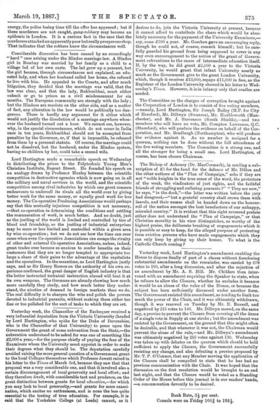Considerable discussion has been caused by an exceedingly " hard"
case arising under the Hindoo marriage law. A Hindoo girl in Bombay was married by her family as a child to a village lad of her own caste. The lad grew up a peasant, but the girl became, through circumstances not explained, an edu- cated lady, and when her husband called her home, she refused to live with him. He appealed to the Courts, and after much litigation, they decided that the marriage was valid, that the law was clear, and that the lady, Reichmibbai, must either submit or go to prison as a civil misdemeanant for six months. The European community are strongly with the lady ; but the Hindoos are resolute on the other side, and as a matter of fact, any alteration in the law would be politically too dan- gerous. There is hardly any argument for it either which would not justify the dissolution of a marriage anywhere when- ever the husband turned out a boor. We cannot see, however, why, in the special circumstances, which do not occur in India once in ten years, Rukhmibhai should not be exempted from penalties by the Governor, or, if that is impossible, be released from them by a personal statute. Of course, the marriage could not be dissolved, but the husband, under the Hindoo system, having no children by her, could take a second wife.


































 Previous page
Previous page